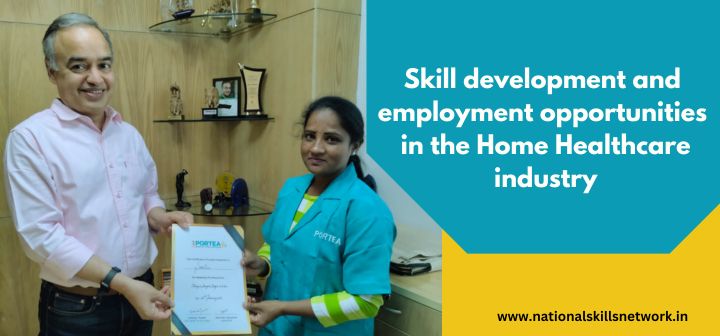“Caregiving is a significant part of Portea’s service offering. Caregivers are well-trained in medical aspects, empathy and compassion, as they are expected to work closely with patients and their families. Training in caregiving is vital to ensure that patients receive the support they need, from a medical and personal perspective,” Mr. Vaibhav Tiwari, Co-Founder and CEO, Portea.
“Greater investment in care services can create an additional 300 million jobs globally, many of which will be for women. In turn this will help increase female labour force participation and advance Sustainable Development Goal (SDG) 8 (which is to ‘promote sustained, inclusive and sustainable economic growth, full and productive employment and decent work for all’).” source: International Labour Organization (ILO)
To learn more about skill training, jobs, career growth opportunities, the use of technology in the Home Healthcare industry and more, we spoke with Mr. Vaibhav Tiwari, Co-Founder and CEO, Portea.
Below are a few excerpts from our conversation. You can watch the full video on our YouTube channel.
Q. Tell us about the Portea’s journey in the Home Healthcare sector.
A. Portea provides hospital-level care services to patients at home, including post-operative care, primary care, chronic disease management, and elder care. With a presence in 40 cities and serving over a million patients, Portea aims to provide patients with the opportunity to heal in a more familiar and comfortable setting while receiving the same quality of care as in a hospital.
Q. Can you explain how Portea sources and trains DDU-GKY students for nursing and Bedside Assistant roles, and are they job-ready when they begin working with Portea?
A. We work with National Skill Development Council (NSDC) partners to source nursing and bedside assistance candidates. Candidates go through a pre-placement talk and interview process, followed by 10-12 days of training focused on home care and using Portea’s applications. After certification, candidates are placed in patients’ homes. They undergo ongoing on-the-job and classroom or video training before they are placed.
Q. What are the challenges faced by Portea in training and upskilling caregivers, and how does Portea address these challenges?
A. For example, providing critical care at home requires a comprehensive and intense level of care for patients. It involves setting up an entire ICU at home with the equipment, doctors, and senior nurses available around the patient’s home. The challenge is providing the necessary medical equipment and expertise and coordinating with the treating doctor and the patient’s family.
Continuation of care becomes very important, and this involves collecting data and coordinating with the treating doctor to make sure the treatment plan is adjusted as required. This level of care requires well-trained and experienced nurses. Portea strongly emphasizes medical expertise in its training programs for nurses and coordinators.

Q. What are some of the opportunities for career growth for caregivers?
A. Portea offers various career growth opportunities for our caregivers, including training, upskilling, and professional development. With over ten years of experience and thousands of trained individuals, this is becoming a viable career option for many, especially young girls from rural areas. It is a job that provides high dignity, allowing caregivers to make a difference in someone’s life.
There are three options for career growth:
- Administrative position: Administrators work with caregivers and families
- Team Leader: Team leaders supervise the caregiving teams
- Subject Matter Expert (SME): Subject Matter Experts have specialized knowledge and skills and can provide higher-end care. Some caregivers upskill themselves in nursing and become trainers for the next batch of caregivers.
Around 30-40% of our caregivers prefer to continue caregiving as they enjoy it and believe in its importance. However, we provide all possible opportunities for them to build their skills and grow in their career, ensuring their professional development.
Q. How has COVID-19 impacted the services offered by Portea, and what were the learnings in utilizing technology to provide better care?
A. During the COVID-19 pandemic, there was a huge demand for home care services as people hesitated to leave their homes, especially older people and those with severe medical conditions. This led to increased popularity and awareness of home care services, and insurance companies began to cover home isolation as part of their policies.
Upon utilizing technology, patients became more comfortable using point-of-care devices, and clinicians could use technology to collect and analyse patient data, leading to more customized care plans. As a result, the use of technology in home healthcare services increased significantly and is expected to continue growing in the coming years.













